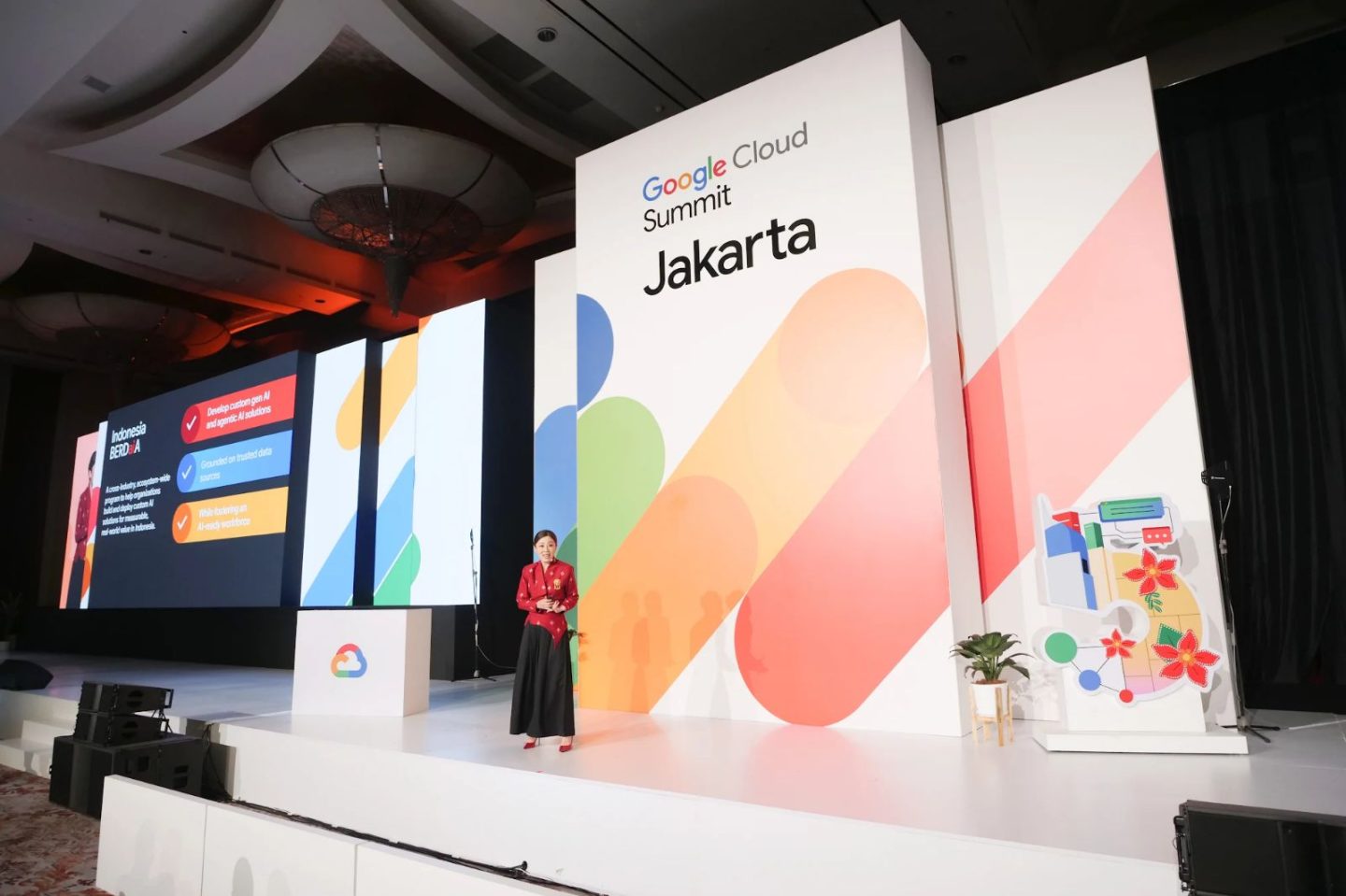- Google announced plans to expand its Jakarta region for AI and cloud growth at the Google Cloud Summit Jakarta.
- The upgrade cuts downtime, meets data rules, and supports more AI.
Google Cloud is adding more computing power to its data centre operations in Jakarta. The move supports growing demand for cloud-based services and AI tools across Indonesia. The company made the announcement earlier this month, and its plans were highlighted again during the Google Cloud Summit Jakarta.
The Jakarta cloud region includes several data centres in Indonesia that provide the infrastructure for digital services. These sites are used by businesses and public sector agencies to run systems, store data, and access cloud tools like AI platforms and analytics software. Since launching the Jakarta cloud region in 2020, Google Cloud says it has played a role in supporting the country’s economic growth and job creation. Looking ahead, it expects to contribute Rp 1,400 trillion (about US$ 88 billion) to the economy over the next five years, and help support nearly 240,000 jobs annually.
Local organisations have used the Jakarta region to run digital banking services, enable remote education, deliver vaccines, and streamline logistics. Google Cloud says many of these groups have cut their IT costs by 20% after shifting from on-premises systems to the cloud.
These cloud services also help businesses make use of AI. Tools like BigQuery and Vertex AI are already being used to train and deploy generative AI models. Companies can customise these tools to support internal workflows, improve customer experiences, or develop new services. The AI models can be trained on the organisation’s own data to ensure accuracy and control.
To meet growing interest in these services, Google Cloud is scaling up its local infrastructure. It says the updated facilities in Jakarta include next-gen chips and systems built for AI applications. The infrastructure is connected to Google’s global network, giving businesses low-latency access to services in other regions and support for international expansion. This network includes fibre routes across 200 countries and territories.
The Jakarta region is also designed with data residency and compliance needs in mind. Organisations can keep their data within Indonesia and meet industry regulations while using high-availability systems with backup and disaster recovery features. According to Google Cloud, companies that have moved to the Jakarta region have seen unplanned application downtime drop by more than 50%.
At the summit, Google Cloud introduced a new AI-focused accelerator program for startups. The initiative, developed with the Ministry of Communications and Digital Affairs (Komdigi), intends to support startups build products that use generative or agent-based AI. The program will begin in September and will offer selected startups with cloud credits, technical support, training, and a platform for pitching to investors.
Over the next five years, the goal is to support 100 Indonesian AI startups through this program. Past accelerator participants include well-known Indonesian companies such as Gojek and Kata.ai.
Also announced at the summit was the Indonesia BerdAIa program, designed to help large organisations co-develop AI solutions. The program includes 15 initial partners, such as national banks, telecom providers, healthcare firms, and universities. The goal is to give these organisations access to AI expertise, help them build custom roadmaps, and identify practical AI use cases that can create business value.
Participants will also receive help developing AI tools that work with their current systems and guidance on setting up responsible AI practices. Training programs are included as well, with partners like Accenture and McKinsey involved in supporting these efforts.
Some organisations are already putting these tools into practice. Indosat Ooredoo Hutchison added a gen AI search assistant to its mobile app, letting users ask questions in Bahasa Indonesia or English. The AI replies with service suggestions and data packages suited to each user.
Paragon Technology and Innovation is using AI to handle large orders from retailers. Its system reads images and PDFs to create order drafts automatically. The company also uses AI to analyse online content, helping its teams stay in tune with popular trends.
Fore Coffee, a local coffee chain, uses BigQuery to manage inventory and customer data. These insights help shape product offerings. For example, it developed the Kopi Gembira campaign by identifying a mix of popular flavours and surplus ingredients.
Universitas Brawijaya is using AI tools from Google Cloud and local startup Sarana AI to enhance learning and career development. Lecturers use AI agents to build course materials, while students practice job interviews and receive personalised upskilling plans.
These efforts reflect Indonesia’s broader goal of becoming a regional leader in AI. Programs like Indonesia BerdAIa and the new accelerator are part of ongoing collaborations between Google Cloud, government agencies, and local organisations to support digital growth and prepare for the future of work.







